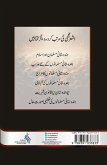The Muslim population in India was historically a minority. As long as they retained political influence and control, they were largely unconcerned with the affairs of the Islamic world. However, as their political power diminished and they lost their position of authority, they began to address the challenges facing the Islamic world. When Kar approached the British, they were suddenly confronted with a lack of agency. At this juncture, two potential responses could be anticipated from them. Firstly, by establishing a collaborative relationship with other nations within India, a foundation was laid for engagement with this land. Secondly, the objective was to establish relations with the Islamic world. Muslims, on the other hand, opted for a different approach, seeking solutions to their problems beyond the boundaries of India. Similarly, Iqbal espoused this perspective and counseled the Muslim community in India to pursue unity with the Islamic world as a means of addressing their challenges. The concept of the 'Muslim Ummah' as espoused by Iqbal continues to exert a significant influence on contemporary Muslims. It is frequently asserted that the root cause of the suffering of Muslims is their disunity. This is based on the assumption that Muslims are not united and that this lack of unity is the basis of the problem. Furthermore, it is claimed that the rise of Muslims in the past was due to their unity. This assumption not only demonstrates a lack of historical knowledge but also represents a form of self-delusion. In fact, since the death of the Prophet of Islam until the present day, there has never been a period when Muslims were united. This situation is not exclusive to Muslims; followers of other religions and beliefs have also been engaged in conflict over mutual interests, as unity is not contingent on faith but rather based on common interests. The issue of political identity among Muslims emerged during the British colonial period when they became increasingly aware that under a democratic system of government, they would remain a minority under the Hindu majority. This sentiment of inferiority gave rise to the two-nation ideology.
Hinweis: Dieser Artikel kann nur an eine deutsche Lieferadresse ausgeliefert werden.
Hinweis: Dieser Artikel kann nur an eine deutsche Lieferadresse ausgeliefert werden.








